Our voices: Shaping health care together | Ō mātou reo: He tārai tahi i te tauwhiro hauora
About the event
Nau mai, haere mai, Kia orana, Talofa lava, Tālofa ni, Ni sa bula vinaka, Malo e lelei, Fakatalofa atu, Fakalofa lahi atu, Noa’ia, Mauri and welcome to Our voices: Shaping health care together | Ō mātou reo: He tārai tahi i te tauwhiro hauora hui.
Te Tāhū Hauora Health Quality & Safety Commission is excited to build on the knowledge gained from our 2023 hui, as we focus on shaping health care together.
This event was both for consumers and whānau and for people working in the health sector who are interested in helping the health system design services for the communities they serve. You might be new to consumer and whānau engagement, or you might have some consumer engagement experience. You might be a member of the broader community interested in improving health services. Everyone is welcome.
- Increase your confidence and learn more about taking part in consumer and whānau engagement health initiatives.
- Explore how the code of expectations is impacting the health sector.
- Hear how consumers, whānau and community perspectives are shaping the design and delivery of health services.
- Connect with others involved in consumer and whānau engagement in the health sector and share best practice.
Our voices 2024 programme (607KB, pdf).
Speakers
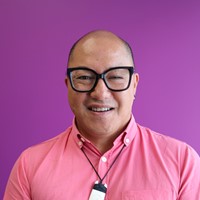 Akira currently works for Te Whatu Ora as National Lead Rainbow Communities, a new role in Service Improvement and Innovation and part of the Consumer Engagement and Whānau Voice team. Prior to this he was a Workforce Development Partner with the Te Whatu Ora Waitaha | Canterbury Equity, Diversity and Inclusion Team within People and Capability, and held the rainbow, disability and inclusion portfolio.
Akira currently works for Te Whatu Ora as National Lead Rainbow Communities, a new role in Service Improvement and Innovation and part of the Consumer Engagement and Whānau Voice team. Prior to this he was a Workforce Development Partner with the Te Whatu Ora Waitaha | Canterbury Equity, Diversity and Inclusion Team within People and Capability, and held the rainbow, disability and inclusion portfolio.
Based in Ōtautahi Christchurch, and with lived experience of the rainbow, disabled and minority communities, Akira has supported rainbow communities for over 20 years. This includes working professionally as a health promoter teaching relationship and sexuality education with Sexual Wellbeing Aotearoa (formally Family Planning NZ), a community engagement coordinator at the Burnett Foundation (formally NZ AIDS Foundation), a committee member for Christchurch Pride and a facilitator and board member for queer youth group Qtopia. He is passionate about empowering health professionals to feel confident when working with our diverse rainbow communities and removing barriers towards inclusive and equitable health outcomes.
Akira is presenting at the 'How whānau voice can drive improvements' workshop.
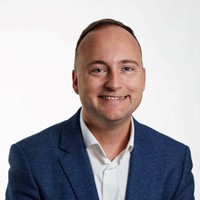 Deon York is director of consumer engagement at Te Tāhū Hauora Health Quality & Safety Commission, responsible for leading all consumer engagement strategies and activities. His prior experience spans the public, private and community sectors.
Deon York is director of consumer engagement at Te Tāhū Hauora Health Quality & Safety Commission, responsible for leading all consumer engagement strategies and activities. His prior experience spans the public, private and community sectors.
Deon is driven by contributing to a health care system that is determined and shaped by what matters to the people it serves. This theme has been a constant in his career to date in the health sector.
Deon is presenting at the 'Code of expectations' session.
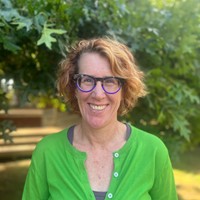 Ruth lives in the North Waikato with her children, farm consultant husband, dog and various livestock. She originally trained as a Biochemist before going to Auckland Medical School as an adult student, she has worked as a doctor throughout New Zealand and Australia since graduating in 1998. She has a particular interest in access to health care and in her pursuit of improving access to care, she has found herself working in the digital health space, particularly telehealth. Ruth Chairs the NZ Telehealth Forum, she is a certified Health Informatician and a Fellow of Health Informatics New Zealand. Her substantive role is as Chief Clinical Officer for Whakarongoaru Aotearoa, she works clinically at Middlemore Hospital and in several rural hospitals in New Zealand.
Ruth lives in the North Waikato with her children, farm consultant husband, dog and various livestock. She originally trained as a Biochemist before going to Auckland Medical School as an adult student, she has worked as a doctor throughout New Zealand and Australia since graduating in 1998. She has a particular interest in access to health care and in her pursuit of improving access to care, she has found herself working in the digital health space, particularly telehealth. Ruth Chairs the NZ Telehealth Forum, she is a certified Health Informatician and a Fellow of Health Informatics New Zealand. Her substantive role is as Chief Clinical Officer for Whakarongoaru Aotearoa, she works clinically at Middlemore Hospital and in several rural hospitals in New Zealand.
Ruth is presenting at the 'Digital health equity: What it is and how you can help’ workshop.
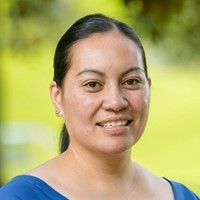 Dr Amio Matenga Ikihele (Niue | Te Whānau-ā-Apanui) is a registered nurse, and GM at Moana Connect. Her current research focuses on digital health equity and the use of digital health tools among Pacific populations. Amio is a member of the New Zealand Telehealth Leadership Group and was the previous chair of the Digital Health Equity Network which was established in 2020 during COVID-19. A Winston Churchill Fellow in 2023, Amio developed the DIGIFALE programme for Pacific communities in Aotearoa, and has continued to advocate for digital health equity among Pacific communities through webinars, podcasts, blogs, publications and more recently through her HRC funded postdoctoral fellowship which examines 'the role of digital health tools among Pacific populations living in Aotearoa'.
Dr Amio Matenga Ikihele (Niue | Te Whānau-ā-Apanui) is a registered nurse, and GM at Moana Connect. Her current research focuses on digital health equity and the use of digital health tools among Pacific populations. Amio is a member of the New Zealand Telehealth Leadership Group and was the previous chair of the Digital Health Equity Network which was established in 2020 during COVID-19. A Winston Churchill Fellow in 2023, Amio developed the DIGIFALE programme for Pacific communities in Aotearoa, and has continued to advocate for digital health equity among Pacific communities through webinars, podcasts, blogs, publications and more recently through her HRC funded postdoctoral fellowship which examines 'the role of digital health tools among Pacific populations living in Aotearoa'.
Dr Amio Matenga Ikihele is presenting at the 'Digital health equity: What it is and how you can help’ workshop.
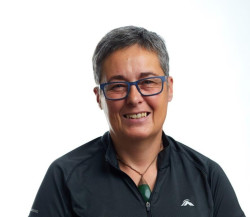 Laura Ellis is Group Manager, Communities, and leads the Consumer Engagement and Whānau Voice team, Service Innovation and Improvement, Te Whatu Ora. Her team holds the national lead roles for co-design, rainbow, disability and PREMs, PROMs and insights. Laura has worked in consumer experience for more than 20 years, in hospitals, at Te Tāhū Hauora Health Quality & Safety Commission and now in her current role.
Laura Ellis is Group Manager, Communities, and leads the Consumer Engagement and Whānau Voice team, Service Innovation and Improvement, Te Whatu Ora. Her team holds the national lead roles for co-design, rainbow, disability and PREMs, PROMs and insights. Laura has worked in consumer experience for more than 20 years, in hospitals, at Te Tāhū Hauora Health Quality & Safety Commission and now in her current role.
Laura is committed to understanding the experiences of people who use health systems, while holding the system accountable to making changes based on those experiences.
Laura is presenting at the 'How whānau voice can drive improvements' workshop.
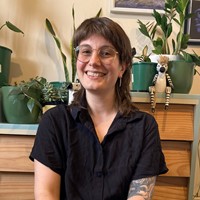 Leo Goldie-Anderson is a proud disabled person and advocate for inclusive, accessible and rights-based health services.
Leo Goldie-Anderson is a proud disabled person and advocate for inclusive, accessible and rights-based health services.
They are a senior disability lead for Te Whatu Ora, and have been providing disability equity leadership across the health care system since 2019, including throughout the COVID-19 response.
Leo is presenting at the 'Reframing disability in health' workshop.
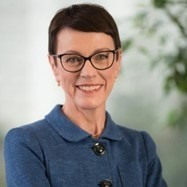 Morag took up the role after serving nearly 13 years as a Coroner based in Auckland. She was formerly a Crown Prosecutor, Director of Proceedings for the Health and Disability Commissioner’s Office, and a Senior Legal Adviser at Crown Law.
Morag took up the role after serving nearly 13 years as a Coroner based in Auckland. She was formerly a Crown Prosecutor, Director of Proceedings for the Health and Disability Commissioner’s Office, and a Senior Legal Adviser at Crown Law.
Since completing her Master of Laws degree, her legal practice has had a strong focus on healthcare law, and she has appeared in different courts and tribunals on a variety of health-related litigation. She has also lectured and published on a range of medico-legal issues.
Morag is committed to promoting and protecting the rights of health and disability services consumers where the Code sets the benchmark for good practice, and opportunities for learning and quality improvement are embraced. She strongly values the importance of fair, timely, transparent, and culturally appropriate processes where people are engaged, and given the opportunity to be heard.
Morag is presenting at the 'Knowing your rights' workshop.
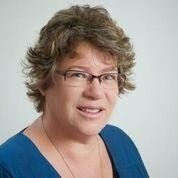 Rachel Noble MNZM is the General Manager: Disability within Te Whatu Ora. Rachel comes from a teaching and NGO background. She is a long time activist within the Deaf and disability community. Rachel is Deaf, the two interpreters here today are for us all. The focus of the disability team is to create inclusive and accessible healthcare services so all people are safe.
Rachel Noble MNZM is the General Manager: Disability within Te Whatu Ora. Rachel comes from a teaching and NGO background. She is a long time activist within the Deaf and disability community. Rachel is Deaf, the two interpreters here today are for us all. The focus of the disability team is to create inclusive and accessible healthcare services so all people are safe.
Rachel is presenting at the 'Reframing disability in health' workshop.
Originally 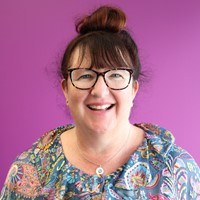 qualifying as a Registered Nurse and then graduating with a Master of Public Health in Melbourne, Australia, Suzanne has worked for over 30 years in a range of health-related positions in both Australia and New Zealand. This includes clinical and service leadership, project management within large tertiary health providers as well as state government, academia, population health, quality improvement and more recently patient experience and consumer and community engagement. Over 10 years ago Suzanne supported Alfred Health, Melbourne, as the first health service to implement the new Australian national health care standards mandating consumer engagement and the use of patient feedback in planning, design and improvement.
qualifying as a Registered Nurse and then graduating with a Master of Public Health in Melbourne, Australia, Suzanne has worked for over 30 years in a range of health-related positions in both Australia and New Zealand. This includes clinical and service leadership, project management within large tertiary health providers as well as state government, academia, population health, quality improvement and more recently patient experience and consumer and community engagement. Over 10 years ago Suzanne supported Alfred Health, Melbourne, as the first health service to implement the new Australian national health care standards mandating consumer engagement and the use of patient feedback in planning, design and improvement.
She has continued to advocate for the integration and reporting of patient feedback and other measures to systematically inform health service improvements in New Zealand at both Te Toka Tumai Auckland and Counties Manukau in several patient experience leadership roles. Suzanne considers the position of National Lead PREMs, PROMs and Insights as an opportunity to build a national framework that focuses on creating meaning from a range of patient measures that automatically informs service evaluation, planning, design and implementation at the local, district, regional and national level.
Suzanne will be presenting at the 'How whānau voice can drive improvements' workshop.
Speaker: Akira Le Fevre
 Akira currently works for Te Whatu Ora as National Lead Rainbow Communities, a new role in Service Improvement and Innovation and part of the Consumer Engagement and Whānau Voice team. Prior to this he was a Workforce Development Partner with the Te Whatu Ora Waitaha | Canterbury Equity, Diversity and Inclusion Team within People and Capability, and held the rainbow, disability and inclusion portfolio.
Akira currently works for Te Whatu Ora as National Lead Rainbow Communities, a new role in Service Improvement and Innovation and part of the Consumer Engagement and Whānau Voice team. Prior to this he was a Workforce Development Partner with the Te Whatu Ora Waitaha | Canterbury Equity, Diversity and Inclusion Team within People and Capability, and held the rainbow, disability and inclusion portfolio.
Based in Ōtautahi Christchurch, and with lived experience of the rainbow, disabled and minority communities, Akira has supported rainbow communities for over 20 years. This includes working professionally as a health promoter teaching relationship and sexuality education with Sexual Wellbeing Aotearoa (formally Family Planning NZ), a community engagement coordinator at the Burnett Foundation (formally NZ AIDS Foundation), a committee member for Christchurch Pride and a facilitator and board member for queer youth group Qtopia. He is passionate about empowering health professionals to feel confident when working with our diverse rainbow communities and removing barriers towards inclusive and equitable health outcomes.
Akira is presenting at the 'How whānau voice can drive improvements' workshop.
Speaker: Deon York
 Deon York is director of consumer engagement at Te Tāhū Hauora Health Quality & Safety Commission, responsible for leading all consumer engagement strategies and activities. His prior experience spans the public, private and community sectors.
Deon York is director of consumer engagement at Te Tāhū Hauora Health Quality & Safety Commission, responsible for leading all consumer engagement strategies and activities. His prior experience spans the public, private and community sectors.
Deon is driven by contributing to a health care system that is determined and shaped by what matters to the people it serves. This theme has been a constant in his career to date in the health sector.
Deon is presenting at the 'Code of expectations' session.
Speaker: Dr Ruth Large
 Ruth lives in the North Waikato with her children, farm consultant husband, dog and various livestock. She originally trained as a Biochemist before going to Auckland Medical School as an adult student, she has worked as a doctor throughout New Zealand and Australia since graduating in 1998. She has a particular interest in access to health care and in her pursuit of improving access to care, she has found herself working in the digital health space, particularly telehealth. Ruth Chairs the NZ Telehealth Forum, she is a certified Health Informatician and a Fellow of Health Informatics New Zealand. Her substantive role is as Chief Clinical Officer for Whakarongoaru Aotearoa, she works clinically at Middlemore Hospital and in several rural hospitals in New Zealand.
Ruth lives in the North Waikato with her children, farm consultant husband, dog and various livestock. She originally trained as a Biochemist before going to Auckland Medical School as an adult student, she has worked as a doctor throughout New Zealand and Australia since graduating in 1998. She has a particular interest in access to health care and in her pursuit of improving access to care, she has found herself working in the digital health space, particularly telehealth. Ruth Chairs the NZ Telehealth Forum, she is a certified Health Informatician and a Fellow of Health Informatics New Zealand. Her substantive role is as Chief Clinical Officer for Whakarongoaru Aotearoa, she works clinically at Middlemore Hospital and in several rural hospitals in New Zealand.
Ruth is presenting at the 'Digital health equity: What it is and how you can help’ workshop.
Speaker: Dr Amio Matenga Ikihele
 Dr Amio Matenga Ikihele (Niue | Te Whānau-ā-Apanui) is a registered nurse, and GM at Moana Connect. Her current research focuses on digital health equity and the use of digital health tools among Pacific populations. Amio is a member of the New Zealand Telehealth Leadership Group and was the previous chair of the Digital Health Equity Network which was established in 2020 during COVID-19. A Winston Churchill Fellow in 2023, Amio developed the DIGIFALE programme for Pacific communities in Aotearoa, and has continued to advocate for digital health equity among Pacific communities through webinars, podcasts, blogs, publications and more recently through her HRC funded postdoctoral fellowship which examines 'the role of digital health tools among Pacific populations living in Aotearoa'.
Dr Amio Matenga Ikihele (Niue | Te Whānau-ā-Apanui) is a registered nurse, and GM at Moana Connect. Her current research focuses on digital health equity and the use of digital health tools among Pacific populations. Amio is a member of the New Zealand Telehealth Leadership Group and was the previous chair of the Digital Health Equity Network which was established in 2020 during COVID-19. A Winston Churchill Fellow in 2023, Amio developed the DIGIFALE programme for Pacific communities in Aotearoa, and has continued to advocate for digital health equity among Pacific communities through webinars, podcasts, blogs, publications and more recently through her HRC funded postdoctoral fellowship which examines 'the role of digital health tools among Pacific populations living in Aotearoa'.
Dr Amio Matenga Ikihele is presenting at the 'Digital health equity: What it is and how you can help’ workshop.
Speaker: Laura Ellis
 Laura Ellis is Group Manager, Communities, and leads the Consumer Engagement and Whānau Voice team, Service Innovation and Improvement, Te Whatu Ora. Her team holds the national lead roles for co-design, rainbow, disability and PREMs, PROMs and insights. Laura has worked in consumer experience for more than 20 years, in hospitals, at Te Tāhū Hauora Health Quality & Safety Commission and now in her current role.
Laura Ellis is Group Manager, Communities, and leads the Consumer Engagement and Whānau Voice team, Service Innovation and Improvement, Te Whatu Ora. Her team holds the national lead roles for co-design, rainbow, disability and PREMs, PROMs and insights. Laura has worked in consumer experience for more than 20 years, in hospitals, at Te Tāhū Hauora Health Quality & Safety Commission and now in her current role.
Laura is committed to understanding the experiences of people who use health systems, while holding the system accountable to making changes based on those experiences.
Laura is presenting at the 'How whānau voice can drive improvements' workshop.
Speaker: Leo Goldie-Anderson
 Leo Goldie-Anderson is a proud disabled person and advocate for inclusive, accessible and rights-based health services.
Leo Goldie-Anderson is a proud disabled person and advocate for inclusive, accessible and rights-based health services.
They are a senior disability lead for Te Whatu Ora, and have been providing disability equity leadership across the health care system since 2019, including throughout the COVID-19 response.
Leo is presenting at the 'Reframing disability in health' workshop.
Speaker: Morag McDowell
 Morag took up the role after serving nearly 13 years as a Coroner based in Auckland. She was formerly a Crown Prosecutor, Director of Proceedings for the Health and Disability Commissioner’s Office, and a Senior Legal Adviser at Crown Law.
Morag took up the role after serving nearly 13 years as a Coroner based in Auckland. She was formerly a Crown Prosecutor, Director of Proceedings for the Health and Disability Commissioner’s Office, and a Senior Legal Adviser at Crown Law.
Since completing her Master of Laws degree, her legal practice has had a strong focus on healthcare law, and she has appeared in different courts and tribunals on a variety of health-related litigation. She has also lectured and published on a range of medico-legal issues.
Morag is committed to promoting and protecting the rights of health and disability services consumers where the Code sets the benchmark for good practice, and opportunities for learning and quality improvement are embraced. She strongly values the importance of fair, timely, transparent, and culturally appropriate processes where people are engaged, and given the opportunity to be heard.
Morag is presenting at the 'Knowing your rights' workshop.
Speaker: Rachel Noble
 Rachel Noble MNZM is the General Manager: Disability within Te Whatu Ora. Rachel comes from a teaching and NGO background. She is a long time activist within the Deaf and disability community. Rachel is Deaf, the two interpreters here today are for us all. The focus of the disability team is to create inclusive and accessible healthcare services so all people are safe.
Rachel Noble MNZM is the General Manager: Disability within Te Whatu Ora. Rachel comes from a teaching and NGO background. She is a long time activist within the Deaf and disability community. Rachel is Deaf, the two interpreters here today are for us all. The focus of the disability team is to create inclusive and accessible healthcare services so all people are safe.
Rachel is presenting at the 'Reframing disability in health' workshop.
Speaker: Suzanne Corcoran
Originally  qualifying as a Registered Nurse and then graduating with a Master of Public Health in Melbourne, Australia, Suzanne has worked for over 30 years in a range of health-related positions in both Australia and New Zealand. This includes clinical and service leadership, project management within large tertiary health providers as well as state government, academia, population health, quality improvement and more recently patient experience and consumer and community engagement. Over 10 years ago Suzanne supported Alfred Health, Melbourne, as the first health service to implement the new Australian national health care standards mandating consumer engagement and the use of patient feedback in planning, design and improvement.
qualifying as a Registered Nurse and then graduating with a Master of Public Health in Melbourne, Australia, Suzanne has worked for over 30 years in a range of health-related positions in both Australia and New Zealand. This includes clinical and service leadership, project management within large tertiary health providers as well as state government, academia, population health, quality improvement and more recently patient experience and consumer and community engagement. Over 10 years ago Suzanne supported Alfred Health, Melbourne, as the first health service to implement the new Australian national health care standards mandating consumer engagement and the use of patient feedback in planning, design and improvement.
She has continued to advocate for the integration and reporting of patient feedback and other measures to systematically inform health service improvements in New Zealand at both Te Toka Tumai Auckland and Counties Manukau in several patient experience leadership roles. Suzanne considers the position of National Lead PREMs, PROMs and Insights as an opportunity to build a national framework that focuses on creating meaning from a range of patient measures that automatically informs service evaluation, planning, design and implementation at the local, district, regional and national level.
Suzanne will be presenting at the 'How whānau voice can drive improvements' workshop.
Ō mātou reo: Consumer and whānau voice (panel)
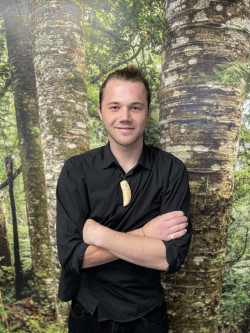 Mai i maketū ki Tongariro, mai i te ihu ki te kei. Mai i te Ohomairangi ki waikorohū o Waihī, ki reira e tū tonu ana te whare ariki, ko au kei roto. Tīhei mauri ora!
Mai i maketū ki Tongariro, mai i te ihu ki te kei. Mai i te Ohomairangi ki waikorohū o Waihī, ki reira e tū tonu ana te whare ariki, ko au kei roto. Tīhei mauri ora!
Jaden was born and raised in Te Waiariki (Bay of Plenty) and is of both Māori (Ngāti Tūwharetoa) and European whakapapa. Passionately advocating for the transformative power of storytelling and personal identity, he actively promotes te reo, tikanga and mātauranga Māori.
In 2013, life threw Jaden a curveball when he was diagnosed with type 1 diabetes, a chronic autoimmune condition requiring him to be insulin dependent. He now actively supports the use of diabetic consumer technologies such as continuous glucose monitors and insulin pumps, integrating them into his daily life. His passions have led him to this role within the Young Voices Advisory Group, ensuring the voices of young Māori, Pasifika and his community facing similar challenges are heard and authentically represented.
Oranga whenua, oranga wairua.
If the land is healthy, so are the people.
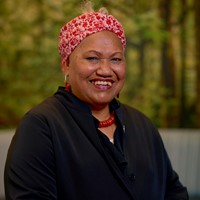 Tofilau Bernadette Pereira serves on the board of trustees for a Pacific clinic in Otara, South Auckland, and she has personal experience as a consumer of health services. She is the national president for Pacifica Incorporated and has done a lot of work helping Pacific mothers and families settle into their adopted country of New Zealand.
Tofilau Bernadette Pereira serves on the board of trustees for a Pacific clinic in Otara, South Auckland, and she has personal experience as a consumer of health services. She is the national president for Pacifica Incorporated and has done a lot of work helping Pacific mothers and families settle into their adopted country of New Zealand.
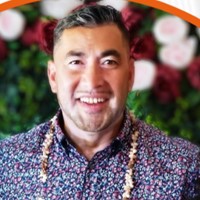 Hailing from Porirua, Zechariah has lived experience of inequalities for Pacific peoples from a young age, from living in cold and damp social housing right through to discrimination with his own journey in the health system.
Hailing from Porirua, Zechariah has lived experience of inequalities for Pacific peoples from a young age, from living in cold and damp social housing right through to discrimination with his own journey in the health system.
Through these experiences, Zechariah was encouraged to become involved in several community networks, organisations and social marketing campaigns to promote the needs of his people.
He is proud now to have a voice that represents his various Pacific communities.
Zechariah believes it is important to understand and use collective Pacific models of health in promoting system change and, ultimately, better health outcomes.
He is pleased to be involved in the consumer network and looks forward to having a strong voice in making a positive contribution for his communities
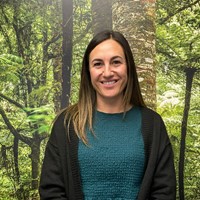 Ko Mihimarino rāua ko Hikurangi ōku Maunga
Ko Mihimarino rāua ko Hikurangi ōku Maunga
Ko Waipapa rāua ko Waiapu ōku Awa
Ko Pahaoa rāua ko Reporua ōku Marae
Ko Mataatua rāua ko Horouta ōku Waka
Ko Te Whānau a Kahurautao me Rangīrunga rāua ko Ngāti Rangi ōku Hapū
Ko Te Whānau a Apanui rāua ko Ngāti Porou ōku Iwi.
Kei Te Kaha au e noho ana
E tamahine au na Ihowa, te Atua o te Paipera
Toni was a teenage māmā of the first of four children at 16 and is nanna to one. She was a peer educator and part of a group that travelled around Auckland high schools, providing insight into teen parenting and health education and support to other rangatahi. That was the start of her career in health and social services. Toni has a deep belief in equity for all people, regardless of socioeconomic status, background and ethnicity, and hopes this consumer network mahi will help to enable that change.
Toni’s lived experience of mental health and addictions, and family violence, birthed her passion for helping others. Her own whānau have suffered deeply with severe mental illness, and due to gaps in the health system have not been able to access the services they need, leading to further decline. This is a common theme across rural communities.
Toni moved home to Te Whānau-ā-Apanui after being made redundant due to COVID-19, and for the last two years has been a Whānau Ora Kaiārahi navigator. She is working on a Level 6 qualification designed by Whānau Ora, the first of its kind, and is grateful how it has enhanced her mahi. She has held kaimahi and frontline roles with Māori and tauiwi health organisations while raising her four children.
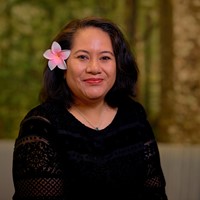 Edna Tu’itupou-Havea is a registered nurse and has had personal experience of poor health care through the care of her son. She is motivated to make sure that no-one else goes through the same thing she has, particularly with an unwell child.
Edna Tu’itupou-Havea is a registered nurse and has had personal experience of poor health care through the care of her son. She is motivated to make sure that no-one else goes through the same thing she has, particularly with an unwell child.
She is a senior nurse lecturer and is studying for her PhD. Her thesis is on Pacific people’s experience in launching formal complaints in hospitals in Aotearoa.
Panelist: Jaden Hura-White
 Mai i maketū ki Tongariro, mai i te ihu ki te kei. Mai i te Ohomairangi ki waikorohū o Waihī, ki reira e tū tonu ana te whare ariki, ko au kei roto. Tīhei mauri ora!
Mai i maketū ki Tongariro, mai i te ihu ki te kei. Mai i te Ohomairangi ki waikorohū o Waihī, ki reira e tū tonu ana te whare ariki, ko au kei roto. Tīhei mauri ora!
Jaden was born and raised in Te Waiariki (Bay of Plenty) and is of both Māori (Ngāti Tūwharetoa) and European whakapapa. Passionately advocating for the transformative power of storytelling and personal identity, he actively promotes te reo, tikanga and mātauranga Māori.
In 2013, life threw Jaden a curveball when he was diagnosed with type 1 diabetes, a chronic autoimmune condition requiring him to be insulin dependent. He now actively supports the use of diabetic consumer technologies such as continuous glucose monitors and insulin pumps, integrating them into his daily life. His passions have led him to this role within the Young Voices Advisory Group, ensuring the voices of young Māori, Pasifika and his community facing similar challenges are heard and authentically represented.
Oranga whenua, oranga wairua.
If the land is healthy, so are the people.
Panelist: Tofilau Bernadette Pereira
 Tofilau Bernadette Pereira serves on the board of trustees for a Pacific clinic in Otara, South Auckland, and she has personal experience as a consumer of health services. She is the national president for Pacifica Incorporated and has done a lot of work helping Pacific mothers and families settle into their adopted country of New Zealand.
Tofilau Bernadette Pereira serves on the board of trustees for a Pacific clinic in Otara, South Auckland, and she has personal experience as a consumer of health services. She is the national president for Pacifica Incorporated and has done a lot of work helping Pacific mothers and families settle into their adopted country of New Zealand.
Panelist: Zechariah Reuelu
 Hailing from Porirua, Zechariah has lived experience of inequalities for Pacific peoples from a young age, from living in cold and damp social housing right through to discrimination with his own journey in the health system.
Hailing from Porirua, Zechariah has lived experience of inequalities for Pacific peoples from a young age, from living in cold and damp social housing right through to discrimination with his own journey in the health system.
Through these experiences, Zechariah was encouraged to become involved in several community networks, organisations and social marketing campaigns to promote the needs of his people.
He is proud now to have a voice that represents his various Pacific communities.
Zechariah believes it is important to understand and use collective Pacific models of health in promoting system change and, ultimately, better health outcomes.
He is pleased to be involved in the consumer network and looks forward to having a strong voice in making a positive contribution for his communities
Panelist: Toni Trinick-Pritchard
 Ko Mihimarino rāua ko Hikurangi ōku Maunga
Ko Mihimarino rāua ko Hikurangi ōku Maunga
Ko Waipapa rāua ko Waiapu ōku Awa
Ko Pahaoa rāua ko Reporua ōku Marae
Ko Mataatua rāua ko Horouta ōku Waka
Ko Te Whānau a Kahurautao me Rangīrunga rāua ko Ngāti Rangi ōku Hapū
Ko Te Whānau a Apanui rāua ko Ngāti Porou ōku Iwi.
Kei Te Kaha au e noho ana
E tamahine au na Ihowa, te Atua o te Paipera
Toni was a teenage māmā of the first of four children at 16 and is nanna to one. She was a peer educator and part of a group that travelled around Auckland high schools, providing insight into teen parenting and health education and support to other rangatahi. That was the start of her career in health and social services. Toni has a deep belief in equity for all people, regardless of socioeconomic status, background and ethnicity, and hopes this consumer network mahi will help to enable that change.
Toni’s lived experience of mental health and addictions, and family violence, birthed her passion for helping others. Her own whānau have suffered deeply with severe mental illness, and due to gaps in the health system have not been able to access the services they need, leading to further decline. This is a common theme across rural communities.
Toni moved home to Te Whānau-ā-Apanui after being made redundant due to COVID-19, and for the last two years has been a Whānau Ora Kaiārahi navigator. She is working on a Level 6 qualification designed by Whānau Ora, the first of its kind, and is grateful how it has enhanced her mahi. She has held kaimahi and frontline roles with Māori and tauiwi health organisations while raising her four children.
Panelist: Edna Tu'itupou-Havea
 Edna Tu’itupou-Havea is a registered nurse and has had personal experience of poor health care through the care of her son. She is motivated to make sure that no-one else goes through the same thing she has, particularly with an unwell child.
Edna Tu’itupou-Havea is a registered nurse and has had personal experience of poor health care through the care of her son. She is motivated to make sure that no-one else goes through the same thing she has, particularly with an unwell child.
She is a senior nurse lecturer and is studying for her PhD. Her thesis is on Pacific people’s experience in launching formal complaints in hospitals in Aotearoa.
How we are going and how you can help (panel)
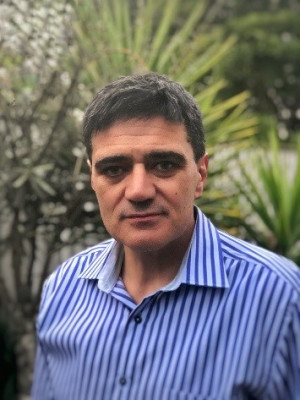 Hector Matthews is a descendent of Te Rarawa and Te Aupōuri, a husband, a father to three tamariki and a grandfather to four mokopuna. Whānau is the centre of Hector’s work and life.
Hector Matthews is a descendent of Te Rarawa and Te Aupōuri, a husband, a father to three tamariki and a grandfather to four mokopuna. Whānau is the centre of Hector’s work and life.
Since leaving the army with the rank of Captain in 1997 after a 1-year peacekeeping mission in the Middle East, Hector has worked in health and in Māori communities. He holds a Bachelor of Arts in te reo Māori and Māori and Indigenous studies and a graduate diploma in telecommunications systems management and is also an ahorei (senior tutor) of Mau Taiaha and a Nidan (second degree black belt) in Seido Karate.
Hector is appointed as the Kaihautū i te Hohenga Kiritaki me te Reo ā-Whānau, Director Consumer Engagement and Whānau Voice within Health New Zealand – Te Whatu Ora. The purpose of Hector’s role is to lead the consumer engagement and whānau voice team, to support Health New Zealand – Te Whatu Ora to be consumer- and whānau-centred, building a health system that is centred on the voices of the people that the system serves.
Essential to this is listening to the voices of consumers, particularly those who have not been served as well as others. Our consumer and whānau voices will strengthen our pathway to pae ora. Making our system more accessible to those with the greatest needs makes our system better for us all.
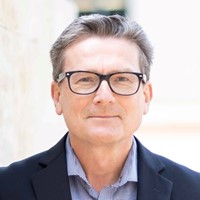 David Hughes MB, ChB, MM(HSM)(dist), FRACMA
David Hughes MB, ChB, MM(HSM)(dist), FRACMA
Director Advice and Assessment and Chief Medical Officer, Pharmac
Prior to joining Pharmac in October 2021, David had been working as the clinical lead of the adverse event learning programme at Te Tāhū Hauora Health Quality & Safety Commission. Over the previous 15 years, he held a number of senior medical leadership roles within the public hospital system in New Zealand.
Originally working in mental health, he became increasingly drawn to addressing system quality and safety issues. He became a fellow of the Royal Australasian College of Medical Administrators in early 2018, having completed a Master of Management degree at Massey University.
He hails from Wales, arriving in New Zealand in 1993. He is the proud father of three adult sons.
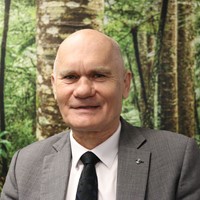 Dr Peter Jansen (Ngāti Hinerangi, Ngāti Raukawa) is the tumuaki chief executive of Te Tāhū Hauora Health Quality & Safety Commission.
Dr Peter Jansen (Ngāti Hinerangi, Ngāti Raukawa) is the tumuaki chief executive of Te Tāhū Hauora Health Quality & Safety Commission.
Dr Jansen is a specialist medical practitioner with extensive experience in health service governance, management, research and service delivery.
He was most recently the medical advisor to ACC. Prior to this, he was the executive director of medical services and clinical governance for a large district health service in New South Wales, Australia during the COVID-19 pandemic.
Dr Jansen is a distinguished Fellow of the Royal New Zealand College of General Practitioners for his work on cultural competence and health equity for Māori.
Dr Jansen is a founding member of Te ORA (Māori Medical Practitioners Association) and Te Akoranga a Māui (the Royal New Zealand College of General Practitioners’ Māori representative group). He was also one of the first board members when Te Tāhū Hauora was established in late 2010.
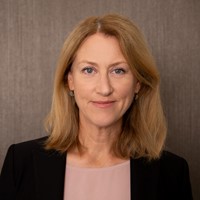 Sam Cliffe is the chief executive of the New Zealand Blood Service and has been with the organisation since 2015, leading the executive team and with accountability to the board.
Sam Cliffe is the chief executive of the New Zealand Blood Service and has been with the organisation since 2015, leading the executive team and with accountability to the board.
Having begun her career as a registered nurse, Sam has spent more than 30 years working in the public health sector both in Aotearoa New Zealand and in the UK. She has worked in senior-level executive roles across a range of organisations, including Counties Manukau District Health Board and the Northern District Health Board Shared Service Agency (now both part of Te Whatu Ora – Health New Zealand) and Manatū Hauora Ministry of Health.
Panelist: Hector Matthews
 Hector Matthews is a descendent of Te Rarawa and Te Aupōuri, a husband, a father to three tamariki and a grandfather to four mokopuna. Whānau is the centre of Hector’s work and life.
Hector Matthews is a descendent of Te Rarawa and Te Aupōuri, a husband, a father to three tamariki and a grandfather to four mokopuna. Whānau is the centre of Hector’s work and life.
Since leaving the army with the rank of Captain in 1997 after a 1-year peacekeeping mission in the Middle East, Hector has worked in health and in Māori communities. He holds a Bachelor of Arts in te reo Māori and Māori and Indigenous studies and a graduate diploma in telecommunications systems management and is also an ahorei (senior tutor) of Mau Taiaha and a Nidan (second degree black belt) in Seido Karate.
Hector is appointed as the Kaihautū i te Hohenga Kiritaki me te Reo ā-Whānau, Director Consumer Engagement and Whānau Voice within Health New Zealand – Te Whatu Ora. The purpose of Hector’s role is to lead the consumer engagement and whānau voice team, to support Health New Zealand – Te Whatu Ora to be consumer- and whānau-centred, building a health system that is centred on the voices of the people that the system serves.
Essential to this is listening to the voices of consumers, particularly those who have not been served as well as others. Our consumer and whānau voices will strengthen our pathway to pae ora. Making our system more accessible to those with the greatest needs makes our system better for us all.
Panelist: Dr David Hughes
 David Hughes MB, ChB, MM(HSM)(dist), FRACMA
David Hughes MB, ChB, MM(HSM)(dist), FRACMA
Director Advice and Assessment and Chief Medical Officer, Pharmac
Prior to joining Pharmac in October 2021, David had been working as the clinical lead of the adverse event learning programme at Te Tāhū Hauora Health Quality & Safety Commission. Over the previous 15 years, he held a number of senior medical leadership roles within the public hospital system in New Zealand.
Originally working in mental health, he became increasingly drawn to addressing system quality and safety issues. He became a fellow of the Royal Australasian College of Medical Administrators in early 2018, having completed a Master of Management degree at Massey University.
He hails from Wales, arriving in New Zealand in 1993. He is the proud father of three adult sons.
Panelist: Dr Peter Jansen
 Dr Peter Jansen (Ngāti Hinerangi, Ngāti Raukawa) is the tumuaki chief executive of Te Tāhū Hauora Health Quality & Safety Commission.
Dr Peter Jansen (Ngāti Hinerangi, Ngāti Raukawa) is the tumuaki chief executive of Te Tāhū Hauora Health Quality & Safety Commission.
Dr Jansen is a specialist medical practitioner with extensive experience in health service governance, management, research and service delivery.
He was most recently the medical advisor to ACC. Prior to this, he was the executive director of medical services and clinical governance for a large district health service in New South Wales, Australia during the COVID-19 pandemic.
Dr Jansen is a distinguished Fellow of the Royal New Zealand College of General Practitioners for his work on cultural competence and health equity for Māori.
Dr Jansen is a founding member of Te ORA (Māori Medical Practitioners Association) and Te Akoranga a Māui (the Royal New Zealand College of General Practitioners’ Māori representative group). He was also one of the first board members when Te Tāhū Hauora was established in late 2010.
Panelist: Sam Cliffe
 Sam Cliffe is the chief executive of the New Zealand Blood Service and has been with the organisation since 2015, leading the executive team and with accountability to the board.
Sam Cliffe is the chief executive of the New Zealand Blood Service and has been with the organisation since 2015, leading the executive team and with accountability to the board.
Having begun her career as a registered nurse, Sam has spent more than 30 years working in the public health sector both in Aotearoa New Zealand and in the UK. She has worked in senior-level executive roles across a range of organisations, including Counties Manukau District Health Board and the Northern District Health Board Shared Service Agency (now both part of Te Whatu Ora – Health New Zealand) and Manatū Hauora Ministry of Health.
Your hosts
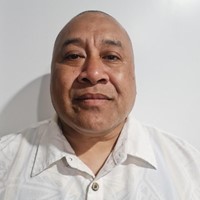 Brian Sagala QSM has 30 years’ experience in public speaking, radio and facilitation. He has been a producer and presenter of 531pi with the Pacific Media Network since 2015 and has used his profile to support various causes within Pacific communities.
Brian Sagala QSM has 30 years’ experience in public speaking, radio and facilitation. He has been a producer and presenter of 531pi with the Pacific Media Network since 2015 and has used his profile to support various causes within Pacific communities.
Brian has helped host community fono with Pacific church leaders on a number of health and wellbeing issues.
He has supported fashion and social services industries as a sought-after presenter and master of ceremonies (MC). He was MC of Pasifika Festival from 2011 to 2019 and of the Miss Samoa Pageant from 2011 to 2016. He helped the then-Northern district health board with the Prepare Pacific COVID-19 campaign to communicate with harder-to-reach segments of the Pacific population during the pandemic, relaying key messaging to the community. While travelling the Pacific region for work, Brian has performed outreach work in local communities in his own time.
He uri tēnei ko Ngāti Tamaoho, Ngāti Koheriki, Ngāti Hako, Pare Hauraki
I te taha o tōku Pāpā
Ko Aukawa Kenneth Edwards tōna ingoa
Ko Tainui tōku waka
Ko Taupiri tōku maunga
Ko Waikato tōku awa
Ko Ngāti Tamaoho, ko Ngāti Koheriki ōku hapū
Ko Mangatangi tōku marae
Ko Waikato Tainui tōku iwi
I te taha o tōku Māmā
Ko Eva Topeora Edwards i whakawhiti i te ingoa Te Whata tōna ingoa
Ko Tainui tōku waka
Ko Moehau, ko Te Aroha ōku maunga
Ko Ohinemuri, ko Piako, ko Waihou ōku awa
Ko Ngāti Hako, ko Pare Hauraki ōku hapū
Ko Kerepeehi tōku marae
Ko Waikato Tainui tōku iwi
Kei Te Papaioea ahau e noho ana inaianei
Ko ahau Te Pou Tūmatanui o te roopu Ahuahu Kaunuku i Te Tāhū Hauora
Kei Te Whanganui a Tara e mahi ana inaianei
Ko Douglas Neil Tekaumaarua Edwards taku ingoa
Mauriora!
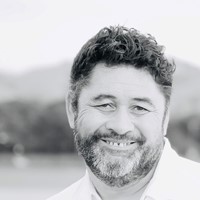 Jonathan Tautari (Ngāpuhi, Ngāti Hine and Ngāti Manaia) is a senior advisor, disability equity lead for Te Tāhū Hauora Health Quality & Safety Commission. Jonathan has worked in the health and disability sector for over 18 years, holding senior advisory and policy management positions.
Jonathan Tautari (Ngāpuhi, Ngāti Hine and Ngāti Manaia) is a senior advisor, disability equity lead for Te Tāhū Hauora Health Quality & Safety Commission. Jonathan has worked in the health and disability sector for over 18 years, holding senior advisory and policy management positions.
He has also worked in communities across Northland and Auckland working alongside tāngata whaikaha Māori and their whānau to share their collective experiences, voices, and stories.
MC: Brian Sagala QSM
 Brian Sagala QSM has 30 years’ experience in public speaking, radio and facilitation. He has been a producer and presenter of 531pi with the Pacific Media Network since 2015 and has used his profile to support various causes within Pacific communities.
Brian Sagala QSM has 30 years’ experience in public speaking, radio and facilitation. He has been a producer and presenter of 531pi with the Pacific Media Network since 2015 and has used his profile to support various causes within Pacific communities.
Brian has helped host community fono with Pacific church leaders on a number of health and wellbeing issues.
He has supported fashion and social services industries as a sought-after presenter and master of ceremonies (MC). He was MC of Pasifika Festival from 2011 to 2019 and of the Miss Samoa Pageant from 2011 to 2016. He helped the then-Northern district health board with the Prepare Pacific COVID-19 campaign to communicate with harder-to-reach segments of the Pacific population during the pandemic, relaying key messaging to the community. While travelling the Pacific region for work, Brian has performed outreach work in local communities in his own time.
Host: Doug Edwards
He uri tēnei ko Ngāti Tamaoho, Ngāti Koheriki, Ngāti Hako, Pare Hauraki
I te taha o tōku Pāpā
Ko Aukawa Kenneth Edwards tōna ingoa
Ko Tainui tōku waka
Ko Taupiri tōku maunga
Ko Waikato tōku awa
Ko Ngāti Tamaoho, ko Ngāti Koheriki ōku hapū
Ko Mangatangi tōku marae
Ko Waikato Tainui tōku iwi
I te taha o tōku Māmā
Ko Eva Topeora Edwards i whakawhiti i te ingoa Te Whata tōna ingoa
Ko Tainui tōku waka
Ko Moehau, ko Te Aroha ōku maunga
Ko Ohinemuri, ko Piako, ko Waihou ōku awa
Ko Ngāti Hako, ko Pare Hauraki ōku hapū
Ko Kerepeehi tōku marae
Ko Waikato Tainui tōku iwi
Kei Te Papaioea ahau e noho ana inaianei
Ko ahau Te Pou Tūmatanui o te roopu Ahuahu Kaunuku i Te Tāhū Hauora
Kei Te Whanganui a Tara e mahi ana inaianei
Ko Douglas Neil Tekaumaarua Edwards taku ingoa
Mauriora!
Host: Jonathan Tautari
 Jonathan Tautari (Ngāpuhi, Ngāti Hine and Ngāti Manaia) is a senior advisor, disability equity lead for Te Tāhū Hauora Health Quality & Safety Commission. Jonathan has worked in the health and disability sector for over 18 years, holding senior advisory and policy management positions.
Jonathan Tautari (Ngāpuhi, Ngāti Hine and Ngāti Manaia) is a senior advisor, disability equity lead for Te Tāhū Hauora Health Quality & Safety Commission. Jonathan has worked in the health and disability sector for over 18 years, holding senior advisory and policy management positions.
He has also worked in communities across Northland and Auckland working alongside tāngata whaikaha Māori and their whānau to share their collective experiences, voices, and stories.
Workshops
Presented by: Dr Ruth Large, Telehealth NZ and Dr Amio Matenga Ikihele (Niue | Te Whānau-ā-Apanui) is a registered nurse, and GM at Moana Connect introduced by LJ Apaipo
(Banquet Room 1)
Development and use of digital technologies to improve health offers promise and opportunity for our communities, but only if access is equitable. At this workshop, you can contribute to a paper on digital health equity, following an ‘unconferencing’ style. The important themes and messages for the paper will be developed by the group and inform the work of the Digital Health Equity Network that sits within the Telehealth Leadership Group (www.telehealth.org.nz).
Presented by: Te Tāhū Hauora Health Quality & Safety Commission He Hoa Tiaki consumer and whānau engagement team
(Banquet Room 2)
This workshop is for consumers and whānau who are new to being involved in improving health services. Learn about opportunities to bring your voice to these improvements and preparing to share your lived experience safely and effectively in different settings.
Presented by Akira Le Fevre, Suzanne Corcoran, Laura Ellis, Health New Zealand consumer engagement and whānau voice team
(Conference Room 2 and 3)
Introducing the new Te Whatu Ora Consumer Engagement and Whānau Voice team from Service Improvement and Innovation with kōrero from the Group Manager Communities, National Lead PREMS, PROMS and Insights, and National Lead Rainbow Communities, who will give you an overview of their priorities and how their lived experience will influence their mahi and how experience data can impact change.
Presented by: Rachel Noble MNZM and Leo Goldie-Anderson, Health New Zealand – Te Whatu Ora
Facilitated with Jonathan Tautari, Te Tāhū Hauora Health Quality & Safety Commission
(Exhibition Room)
Aotearoa New Zealand's health system does not always work for disabled individuals. Health New Zealand prioritises them in the Te Pae Tata plan. This workshop introduces the disability capability framework to help you assess the strengths and areas needing improvement for your organisation to be equitable for disabled people.
Digital health equity: What it is and how you can help
Presented by: Dr Ruth Large, Telehealth NZ and Dr Amio Matenga Ikihele (Niue | Te Whānau-ā-Apanui) is a registered nurse, and GM at Moana Connect introduced by LJ Apaipo
(Banquet Room 1)
Development and use of digital technologies to improve health offers promise and opportunity for our communities, but only if access is equitable. At this workshop, you can contribute to a paper on digital health equity, following an ‘unconferencing’ style. The important themes and messages for the paper will be developed by the group and inform the work of the Digital Health Equity Network that sits within the Telehealth Leadership Group (www.telehealth.org.nz).
Honouring our stories (workshop for consumers)
Presented by: Te Tāhū Hauora Health Quality & Safety Commission He Hoa Tiaki consumer and whānau engagement team
(Banquet Room 2)
This workshop is for consumers and whānau who are new to being involved in improving health services. Learn about opportunities to bring your voice to these improvements and preparing to share your lived experience safely and effectively in different settings.
How whānau voice can drive improvements
Presented by Akira Le Fevre, Suzanne Corcoran, Laura Ellis, Health New Zealand consumer engagement and whānau voice team
(Conference Room 2 and 3)
Introducing the new Te Whatu Ora Consumer Engagement and Whānau Voice team from Service Improvement and Innovation with kōrero from the Group Manager Communities, National Lead PREMS, PROMS and Insights, and National Lead Rainbow Communities, who will give you an overview of their priorities and how their lived experience will influence their mahi and how experience data can impact change.
Reframing disability in health: Disability capability framework workshop
Presented by: Rachel Noble MNZM and Leo Goldie-Anderson, Health New Zealand – Te Whatu Ora
Facilitated with Jonathan Tautari, Te Tāhū Hauora Health Quality & Safety Commission
(Exhibition Room)
Aotearoa New Zealand's health system does not always work for disabled individuals. Health New Zealand prioritises them in the Te Pae Tata plan. This workshop introduces the disability capability framework to help you assess the strengths and areas needing improvement for your organisation to be equitable for disabled people.
